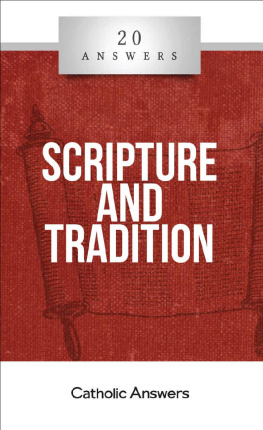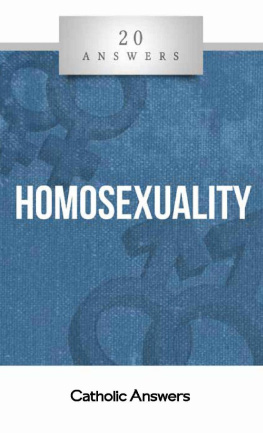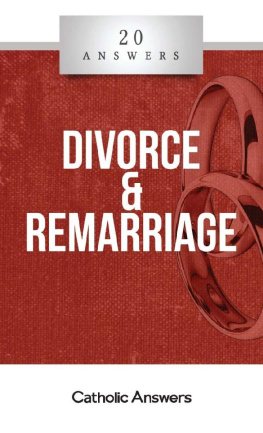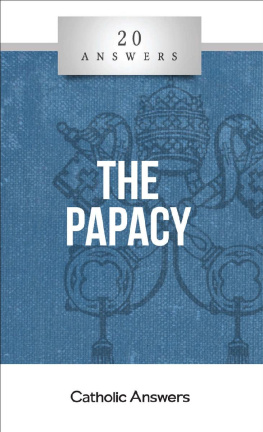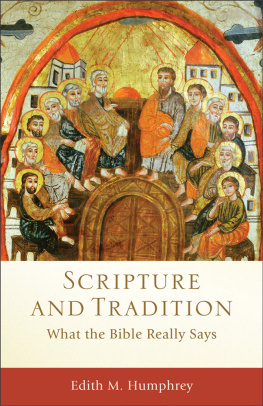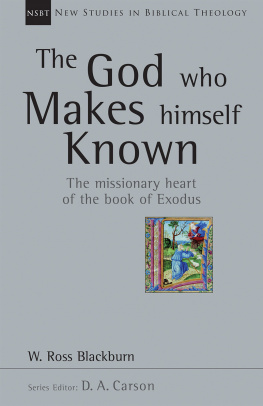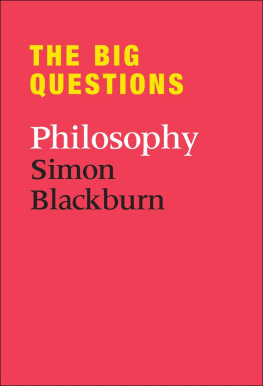Jim Blackburn - 20 Answers- Scripture and Tradition
Here you can read online Jim Blackburn - 20 Answers- Scripture and Tradition full text of the book (entire story) in english for free. Download pdf and epub, get meaning, cover and reviews about this ebook. year: 2016, publisher: Catholic Answers Press, genre: Religion. Description of the work, (preface) as well as reviews are available. Best literature library LitArk.com created for fans of good reading and offers a wide selection of genres:
Romance novel
Science fiction
Adventure
Detective
Science
History
Home and family
Prose
Art
Politics
Computer
Non-fiction
Religion
Business
Children
Humor
Choose a favorite category and find really read worthwhile books. Enjoy immersion in the world of imagination, feel the emotions of the characters or learn something new for yourself, make an fascinating discovery.
- Book:20 Answers- Scripture and Tradition
- Author:
- Publisher:Catholic Answers Press
- Genre:
- Year:2016
- Rating:5 / 5
- Favourites:Add to favourites
- Your mark:
- 100
- 1
- 2
- 3
- 4
- 5
20 Answers- Scripture and Tradition: summary, description and annotation
We offer to read an annotation, description, summary or preface (depends on what the author of the book "20 Answers- Scripture and Tradition" wrote himself). If you haven't found the necessary information about the book — write in the comments, we will try to find it.
20 Answers- Scripture and Tradition — read online for free the complete book (whole text) full work
Below is the text of the book, divided by pages. System saving the place of the last page read, allows you to conveniently read the book "20 Answers- Scripture and Tradition" online for free, without having to search again every time where you left off. Put a bookmark, and you can go to the page where you finished reading at any time.
Font size:
Interval:
Bookmark:
20 Answers
Scripture & Tradition
Jim Blackburn

20 Answers: Scripture and Tradition
Jim Blackburn
2015 Catholic Answers
All rights reserved. Except for quotations, no part of this book may be reproduced or transmitted in any form or by any means, electronic or mechanical, including photocopying, recording, uploading to the Internet, or by any information storage and retrieval system, without written permission from the publisher.
Published by Catholic Answers, Inc.
2020 Gillespie Way
El Cajon, California 92020
1-888-291-8000 orders
619-387-0042 fax
catholic.com
Printed in the United States of America
978-1-941663-35-6
978-1-941663-36-3 Kindle
978-1-941663-37-0 ePub
Table of Contents
Introduction
All Christians generally agree that Christian doctrine must be determined in accordance with Gods revelation. It makes sense that everything God has revealed is worthy of belief and, in many cases, necessary for salvation. Indeed, Jesus, quoting from Deuteronomy 8:3, emphasizes the importance of the word of God : It is written, Man shall not live by bread alone, but by every word that proceeds from the mouth of God (Matt 4:4).
Tragically, though, not all Christians agree on what Gods word is, and thus do not agree on all matters of Christian doctrine.
Most non-Catholic Christians claim that the Bible alone is the word of God. This is a relatively novel idea in the history of Christianity, having come to the fore only since the time of the Protestant Reformation. For most of Christian history, Christians have believed that Scripture does not constitute the entirety of the deposit of faith that the first Christians received long before a book of the New Testament was ever written (see Jude 3).
That faith was first delivered to the early Church orally, not in writing. Scholars nearly unanimously agree that the first books of the New Testament (1 and 2 Thessalonians) were not written until the middle of the first century, around A.D. 5052. Yet, even without these books, the revelation of Jesus Christ was being spread through the oral teaching of the apostles and their successors. The books of the New Testament came to be written over a period of several decades, and it was not always immediately apparent exactly how they should be understood (see 2 Peter 3:16). So the early Christians came to interpret them correctly through authoritative oral teachingwhat the Church calls Sacred Tradition (see 2 Peter 1:2021).
Since the Protestant Reformers rejected Sacred Tradition, the descendants of their faith tradition have been left with only their own fallible interpretations of Scripture alone ( sola scriptura ) with which to determine their doctrines. This has resulted in countless disagreements and widespread splintering into thousands of Christian denominations.
It is my hope that this booklet will help to dispel the myth of sola scriptura and be a useful instrument for helping Christians fully embrace the word of God.
1. What is the word of God?
The term word of God refers to Gods divine revelation to humanity, in which he reveals himself to us for the sake of our salvation. The Vatican II document Dei Verbum (DV) explains:
Through divine revelation, God chose to show forth and communicate himself and the eternal decisions of his will regarding the salvation of men. That is to say, he chose to share with them those divine treasures which totally transcend the understanding of the human mind. (6)Christians generally agree that the fullness of Gods revelation is the Son of God, Jesus Christ. St. John begins his Gospel writing about the Word in this sense:
In the beginning was the Word, and the Word was with God, and the Word was God. He was in the beginning with God; all things were made through him, and without him was not anything made that was made. In him was life, and the life was the light of men. The light shines in the darkness, and the darkness has not overcome it. (John 1:15)Word of God is used in this same sense elsewhere in the New Testament,but we also find a secondary sense of the term: to refer to the spoken and written revelation of God upon which Christian teaching is based, and which is passed on from generation to generation. For example, in the book of Acts, Luke writes about preaching the word of God (6:2) and how it increased (6:7) as well as grew and multiplied (12:24). In Acts 13, the word of God is proclaimed (5), spoken (46), and people came to hear it (7, 44). In Acts 18, St. Paul is depicted teaching the word of God (11).
It is this secondary sense of the term that Christians most often have in mind when we refer to the revelation of God that has been entrusted to the Church and taught throughout history. It contains the truths that Christians must believe and make active in our lives for the sake of our salvation and the salvation of others. St. Jude calls it the faith which was once for all delivered to the saints (Jude 3).
Jesus entrusted this deposit of faith to the apostles and their successors, guided by the Holy Spirit, to be safeguarded from corruption and taught in every age just as Jesus commissioned them to do before his Ascension (see Matt. 28:1920).
Dei Verbum elaborates:
In his gracious goodness, God has seen to it that what he had revealed for the salvation of all nations would abide perpetually in its full integrity and be handed on to all generations. Therefore Christ the Lord in whom the full revelation of the supreme God is brought to completion (see Cor. 1:20; 3:13; 4:6), commissioned the apostles to preach to all men that gospel which is the source of all saving truth and moral teaching, and to impart to them heavenly gifts. This gospel had been promised in former times through the prophets, and Christ himself had fulfilled it and promulgated it with his lips. (7)It is important to recognize that the apostles carried out their commission both through preaching and writing. The Catechism of the Catholic Church (CCC) explains:
In keeping with the Lords command, the gospel was handed on in two ways:1. Orally by the apostles who handed on, by the spoken word of their preaching, by the example they gave, by the institutions they established, what they themselves had receivedwhether from the lips of Christ, from his way of life and his works, or whether they had learned it at the prompting of the Holy Spirit.
2. In writing by those apostles and other men associated with the apostles who, under the inspiration of the same Holy Spirit, committed the message of salvation to writing (76).
In the Catholic Church, we refer to the apostles preaching, examples, and institutions as Sacred Tradition (or apostolic tradition ) and their writing (including the Old Testament that they received from the Jews) as Sacred Scripture . Many other Christians believe that only the written Bible is the word of God. They see Scripture alone as the only definitive source of divine truth. Catholics, however, believe that God did not limit his revelation to a book; instead he gave his saving truth to mankind in two complementary and equally authoritative forms.
There exists a close connection and communication between Sacred Tradition and Sacred Scripture. For both of them, flowing from the same divine wellspring, in a certain way merge into a unity and tend toward the same end... [I]t is not from Sacred Scripture alone that the Church draws her certainty about everything which has been revealed. Therefore both Sacred Tradition and Sacred Scripture are to be accepted and venerated with the same sense of loyalty and reverence. (DV 9)Thus, the Catholic Church bases its teaching upon one source: the word of God, transmitted to his people in two ways.
Next pageFont size:
Interval:
Bookmark:
Similar books «20 Answers- Scripture and Tradition»
Look at similar books to 20 Answers- Scripture and Tradition. We have selected literature similar in name and meaning in the hope of providing readers with more options to find new, interesting, not yet read works.
Discussion, reviews of the book 20 Answers- Scripture and Tradition and just readers' own opinions. Leave your comments, write what you think about the work, its meaning or the main characters. Specify what exactly you liked and what you didn't like, and why you think so.

